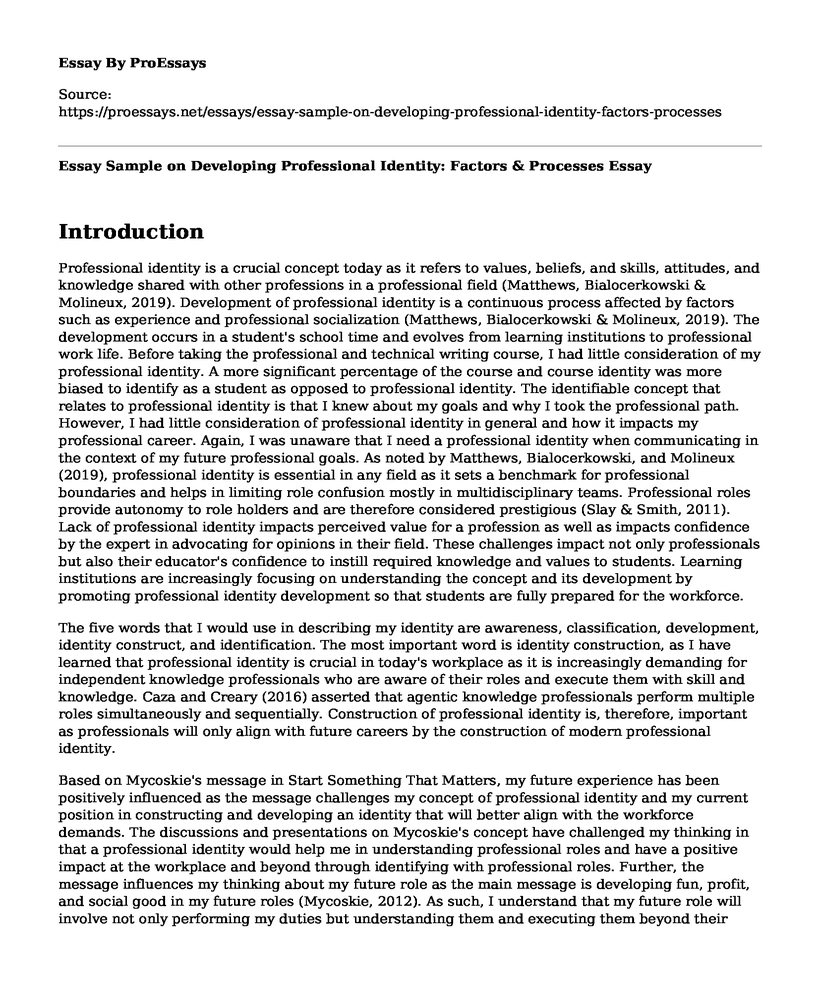Introduction
Professional identity is a crucial concept today as it refers to values, beliefs, and skills, attitudes, and knowledge shared with other professions in a professional field (Matthews, Bialocerkowski & Molineux, 2019). Development of professional identity is a continuous process affected by factors such as experience and professional socialization (Matthews, Bialocerkowski & Molineux, 2019). The development occurs in a student's school time and evolves from learning institutions to professional work life. Before taking the professional and technical writing course, I had little consideration of my professional identity. A more significant percentage of the course and course identity was more biased to identify as a student as opposed to professional identity. The identifiable concept that relates to professional identity is that I knew about my goals and why I took the professional path. However, I had little consideration of professional identity in general and how it impacts my professional career. Again, I was unaware that I need a professional identity when communicating in the context of my future professional goals. As noted by Matthews, Bialocerkowski, and Molineux (2019), professional identity is essential in any field as it sets a benchmark for professional boundaries and helps in limiting role confusion mostly in multidisciplinary teams. Professional roles provide autonomy to role holders and are therefore considered prestigious (Slay & Smith, 2011). Lack of professional identity impacts perceived value for a profession as well as impacts confidence by the expert in advocating for opinions in their field. These challenges impact not only professionals but also their educator's confidence to instill required knowledge and values to students. Learning institutions are increasingly focusing on understanding the concept and its development by promoting professional identity development so that students are fully prepared for the workforce.
The five words that I would use in describing my identity are awareness, classification, development, identity construct, and identification. The most important word is identity construction, as I have learned that professional identity is crucial in today's workplace as it is increasingly demanding for independent knowledge professionals who are aware of their roles and execute them with skill and knowledge. Caza and Creary (2016) asserted that agentic knowledge professionals perform multiple roles simultaneously and sequentially. Construction of professional identity is, therefore, important as professionals will only align with future careers by the construction of modern professional identity.
Based on Mycoskie's message in Start Something That Matters, my future experience has been positively influenced as the message challenges my concept of professional identity and my current position in constructing and developing an identity that will better align with the workforce demands. The discussions and presentations on Mycoskie's concept have challenged my thinking in that a professional identity would help me in understanding professional roles and have a positive impact at the workplace and beyond through identifying with professional roles. Further, the message influences my thinking about my future role as the main message is developing fun, profit, and social good in my future roles (Mycoskie, 2012). As such, I understand that my future role will involve not only performing my duties but understanding them and executing them beyond their scope to make a difference in the world. Through professional identity, I think I will be in a better chance to be the difference that I would like to see in the world.
Conclusion
In conclusion, there is an increasing focus on professional identity construction so that students better understand their professional self-concept based on motives, values, beliefs, attributes, and experiences. Professional identity has become an exciting concept in modern workplaces, and jobs are no longer classified according to the profession, but the knowledge and skills in executing roles as the workforce are dynamic.
References
Barker Caza, B., & Creary, S. (2016). The construction of professional identity. Perspectives on Contemporary Professional Work, 259-285. https://doi.org/10.4337/9781783475582.00022
Matthews, J., Bialocerkowski, A., & Molineux, M. (2019). Professional identity measures for student health professionals - a systematic review of psychometric properties. BMC Medical Education, 19(1). https://doi.org/10.1186/s12909-019-1660-5
Mycoskie, B. (2012). Start something that matters. Random House Digital, Inc..
Slay, H. S., & Smith, D. A. (2011). Professional identity construction: Using narrative to understand the negotiation of professional and stigmatized cultural identities. Human Relations, 64(1), 85-107. https://doi.org/10.1177/0018726710384290
Cite this page
Essay Sample on Developing Professional Identity: Factors & Processes. (2023, Apr 10). Retrieved from https://proessays.net/essays/essay-sample-on-developing-professional-identity-factors-processes
If you are the original author of this essay and no longer wish to have it published on the ProEssays website, please click below to request its removal:
- Ethical Values in Research Methods
- Argumentative Essay on Kant's Conception of Duty
- Family Role Model Personal Essay Example
- Essay on Confucianism in Understanding Virtue Ethics: Beyond Historical Labels
- Essay Example on American Dream: Hard Work for Success & Upward Mobility
- Essay Exaxmple on Ethics & Corporate America: Utilitarianism & Social Standards
- Unraveling Ethical Concerns: Examining Damon Investment Company's 21% Return Claim - Free Paper







